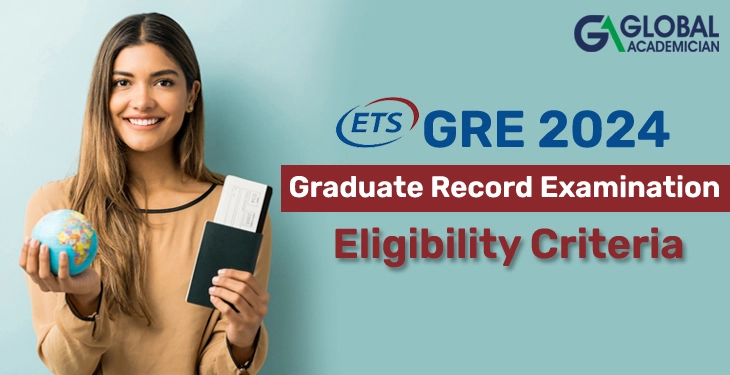
Embarking on the journey to pursue higher education in 2024 requires a key, and the Graduate Record Examination (GRE) is often that key. Understanding the GRE 2024 Eligibility Criteria is the first step toward opening the door to advanced academic pursuits. In this comprehensive guide, we delve into the specific requirements and qualifications that define who can participate in the GRE 2024.
GRE 2024 Eligibility Criteria:
The GRE is designed to be accessible to a wide range of candidates, from recent graduates to working professionals seeking to elevate their academic profiles. Join us as we unravel the nuances of the GRE 2024 Eligibility Criteria, ensuring that you are well-informed and ready to take this pivotal step toward your educational aspirations. Let’s explore the pathways that lead to success in the GRE and, ultimately, to your academic and professional future.
The GRE 2024, conducted by the Educational Testing Service (ETS), operates with a unique perspective on eligibility, setting no specific criteria for candidates. Unlike many standardized tests, GRE doesn’t impose rigid prerequisites, fostering inclusivity for a diverse range of candidates. While there’s no predefined GRE exam eligibility, prospective test-takers are expected to meet general academic qualifications, age requirements, and demonstrate language proficiency during the GRE registration process. In this guide, we navigate through the essential aspects of GRE 2024 eligibility, providing a clear understanding for candidates preparing to embark on this significant academic journey.
1. GRE 2024 Age Criteria:
When it comes to age, the GRE exam exhibits a unique stance by imposing no specific restrictions. The conducting body has not delineated any upper age limit for GRE candidates. This aligns with the inclusive nature of higher education in many study-abroad destinations, where age is not a barrier to academic pursuits. Aspiring candidates, regardless of age, are welcome to register for GRE 2024, provided they furnish the requisite documentation. It’s noteworthy that a substantial percentage of GRE applicants are individuals aged 30 and above, highlighting the diverse age groups choosing the GRE as a pathway to their academic goals.
2. GRE 2024 Education Criteria:
Officially, the Educational Testing Service (ETS) has not prescribed any specific minimum educational requirements for the GRE exam. However, a crucial point to note is that candidates aspiring to take the GRE typically need to possess a graduate degree for admission to various postgraduate programs.
While ETS does not stipulate a minimum educational threshold, most individuals aiming for Master’s or specialized Master’s degrees in disciplines such as business, MBA, law, or pursuing a doctoral degree opt to take the GRE test. To discern the specific GRE eligibility criteria related to academic qualifications, candidates are encouraged to use the GRE website’s facility that provides country-wise information on institutes where they intend to apply. This ensures a nuanced understanding of the academic prerequisites tailored to different educational institutions.
3. GRE 2024 Passing Criteria:
There are no officially specified minimum qualifying marks for the GRE, a rule that holds true for Indian students as well. While there is no predetermined threshold, some universities may implement GRE cutoffs as part of their admission criteria for various courses. In light of this, candidates are strongly encouraged to thoroughly review the GRE exam syllabus and engage in comprehensive preparation to achieve a competitive score. A strong performance in the GRE not only demonstrates proficiency but also enhances the likelihood of securing admission to desired courses.
4. GRE Eligibility Criteria for Disabled Candidates in 2024:
The GRE exam in 2024 is inclusive and accommodates the needs of disabled students. Applicants falling under the disabled category are required to complete a test accommodation request form, which should then be submitted to ETS Disability Services. The accommodations provided encompass a range of adjustments, including extended exam time, breaks between exams, and additional support during the examination.
However, candidates identified under the SSD (Services for Students with Disabilities) category must submit specific documents to verify their eligibility:
- A letter from a qualified professional.
- A copy of the student’s most recent Individualized Education Program (IEP) or 504 Plan.
- A copy of the medical report supporting the disability.
By adhering to these steps, disabled candidates can ensure that the GRE testing environment is tailored to their individual needs, promoting a fair and inclusive examination experience.
GRE At-Home Exam Eligibility:
For those opting for the GRE at-home option, the eligibility requirements mirror those for taking the GRE at a test center. Candidates should ensure a conducive environment with a tabletop setup for the test, possess the necessary computer system, and secure a quiet room devoid of any other individuals during the test. The GRE at-home examination is conducted under online monitoring by a proctor.
In terms of GRE exam eligibility, the process is remarkably inclusive—there is no specified age limit, and no explicit educational qualifications are mandated for test-takers. This lack of age restrictions or educational prerequisites simplifies the GRE exam process, making it accessible to a broad spectrum of individuals.
Requirements for GRE At-Home Checklist:
To smoothly navigate the GRE at-home experience, candidates need to meet the following requirements:
- Desktop or laptop usage.
- A licensed operating system, either Windows 10 or higher, or macOS X 10.13 or higher.
- Compatibility with Chrome or Firefox for the GRE at Home.
- Functional built-in or external webcam.
- Functional built-in or external microphone.
- A valid government-issued ID presented to the proctor.
By adhering to these requirements, candidates can ensure a seamless and secure GRE at-home testing experience, granting flexibility without compromising the integrity of the examination process.
GRE 2024 Eligibility at Test Centers: Health and Safety Protocols
In adherence to the GRE eligibility guidelines, candidates must adhere to specific health and safety protocols when appearing for the exam at test centers. As part of these guidelines, candidates are mandated to bring their own face masks and hand sanitizers to the GRE test centers. This precautionary measure ensures a safe and secure testing environment for all candidates participating in the GRE 2024 examination.
By incorporating these health and safety practices into the eligibility criteria, the GRE test centers prioritize the well-being of candidates, fostering a secure environment for the assessment process. Aspiring test-takers are encouraged to familiarize themselves with these guidelines to ensure a smooth and compliant testing experience at the GRE test centers.
Whether opting for the traditional test center experience, the convenience of the GRE at-home option, or considering health and safety measures at the test centers, each aspect contributes to shaping a fair, inclusive, and secure examination environment.
The absence of age limits, the flexibility of educational qualifications, provisions for disabled candidates, and adherence to health protocols at test centers collectively emphasize the commitment to inclusivity and fairness. As candidates prepare to embark on their GRE journey, navigating these eligibility criteria becomes paramount. Let the journey be not only a testament to academic prowess but also a testament to the adaptability and resilience of every candidate aspiring to excel in their higher education pursuits. The GRE 2024 eligibility criteria serve as the foundation for a standardized yet individualized path to success.
To stay ahead and stay informed about the latest educational updates, trends, and insights, we invite you to subscribe to our newsletter and regularly explore our blog. You can also connect with us on our Facebook Page to join our educational community at Global Academician. Join us on these platforms and embark on a journey of continuous learning and knowledge sharing.




